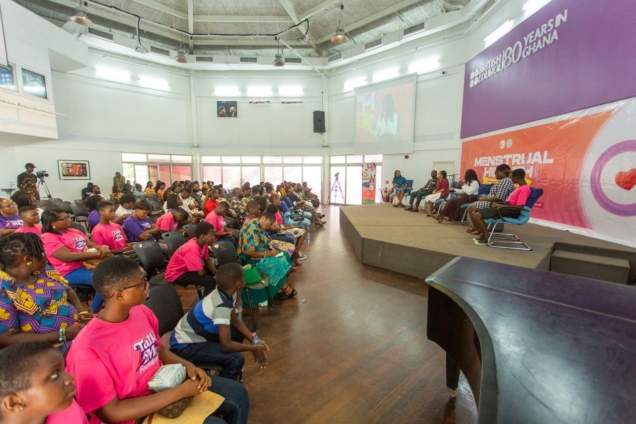
Audio By Carbonatix
The Orange Girl Foundation, in collaboration with the William Wilson Turner Foundation, organized the maiden Menstrual Health Conference to promote menstrual health conversations, particularly for physically challenged girls.
The event, which was held at the British Council in Accra, brought together advocates, individuals and organizations, students, and teachers who are purposely driven by menstrual health conversations in Ghana to identify gaps and find pragmatic solutions for menstrual health management issues.
According to the founder, Ethel Nanayaa Amoako Baffoe, the brain behind the event is to bring everyone together to have one voice in the menstrual health conversations to achieve a common goal.
“We have all been contributing our quota in our various corners, and it was time to come together to have an extensive conversation,” she added.
She also called on the government to remove the taxes on sanitary pads to eliminate period poverty and promote girl child education.
The conference conversations also centered on providing supportive workplace policies for women, especially those with extreme period pain like endometriosis and dysmenorrhea.
Speaking to the news team, Paul Asante, an SDG advocate, said that physically challenged girls are mostly sidelined in the menstrual health conversations.
“Comprehensive education awareness tailored with special learning materials that can be accessed by persons with disabilities should be enforced by the Ministry of Education through the Ghana Education Service,” he said.
He also called for the passing of a legislative instrument or bill in parliament to design menstrual products that are easy to use for individuals with varying physical or cognitive abilities.
The organization stated that the Menstrual Health Conference will be an annual event.
One in ten girls in Sub-Saharan Africa misses school during their menstrual cycle, which can amount to as much as twenty percent of a given school year. Access to affordable menstrual hygiene products is increasingly challenging for many young girls and women in Ghana, especially those in underserved communities, and most importantly, persons living with disabilities.
Latest Stories
-
Some OMCs reduce fuel prices; petrol going for GH¢10.86, diesel GH¢11.96
2 hours -
Trump says health is ‘perfect’ amid ageing concerns
2 hours -
China’s BYD set to overtake Tesla as world’s top EV seller
2 hours -
Joy FM’s iconic 90’s Jam returns tonight: Bigger, better, and packed with nostalgia
3 hours -
Uproar as UG fees skyrocket by over 25% for 2025/2026 academic year
4 hours -
Japan PM joins fight for more female toilets in parliament
5 hours -
Ga Mantse declares war on fishing industry child labour
6 hours -
Adom FM’s ‘Strictly Highlife’ lights up La Palm with rhythm and nostalgia in unforgettable experience
6 hours -
OMCs slash fuel prices as cedi gains
8 hours -
Around 40 dead in Swiss ski resort bar fire, police say
8 hours -
AFCON 2025: Aubameyang and Nsue make history among oldest goalscorers
9 hours -
AFCON 2025: How Kwesi Appiah’s Sudan qualified for round of 16 without scoring any goal
10 hours -
Ghana is rising again – Mahama declares
10 hours -
Firefighters subdue blaze at Accra’s Tudu, officials warn of busy fire season ahead
11 hours -
Luv FM’s Family Party In The Park ends in grand style at Rattray park
11 hours

